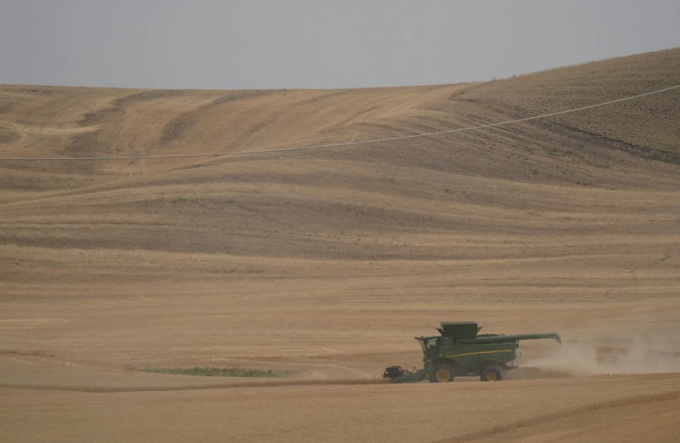November 25, 2025 | 10:39 GMT +7
November 25, 2025 | 10:39 GMT +7
Hotline: 0913.378.918
November 25, 2025 | 10:39 GMT +7
Hotline: 0913.378.918

A combine harvests wheat near Pullman. Photo: Ted S. Warren / The Associated Press
It’s a nice bump, he said, but it’s not enough to make up for the one-third increase in costs from rising gasoline prices over the same period.
Both appear to be ripples from Russia’s invasion of Ukraine, one of the largest wheat exporters in the world.
U.S. wheat prices were already high because of inflation and restricted supplies, but Russia’s invasion of Ukraine has driven up prices of wheat globally and could further increase the prices of U.S. wheat, said Randy Fortenbery, Thomas B. Mick chair in economics at Washington State University.
Russia and Ukraine supply nearly 30% of the world’s wheat from vast and fertile farmlands in the Black Sea region known as the “breadbasket of the world.” But last week, Ukraine banned the export of wheat, oats and other staples to avoid a “humanitarian crisis” among its people, according to a government statement.
As the war and Ukraine’s ban on exporting wheat threatens the global supply, U.S. wheat farmers are also concerned about the increase in their production expenses. It’s still too early to know how the disruptions to the global wheat market will affect Washington’s wheat farmers.
The demand that’s sure to increase out of the situation in Ukraine will continue to contribute to higher prices for buyers overseas, said Glen Squires, CEO of the Washington Grain Commission.
Prices vary depending on markets and type of grain, but in recent days the cost of soft white wheat, the major class of grain grown in Washington, was $11.70 a bushel. Last year, it was around $7.35 in the lower Columbia River District, Portland and Vancouver areas, Squires said.
Although it may seem like the price increase may be a good thing for U.S. farmers, including those in the Pacific Northwest, the rise in production costs, such as fertilizers, pesticides and mechanization, among other things, is cutting into profit, Carstensen said.
“We are price takers and cannot pass along any input cost increases,” he said.
Even before last week’s export ban, there were concerns over global food shortages and further increases in prices as Ukrainian farmers have no other option but to neglect their farms and flee in an attempt to stay alive or fight to remain sovereign, according to The Associated Press.
According to data from the Washington State Grain Commission, wheat is a staple food to more than 35% of the world’s population and provides 20% of the world’s nutritional needs.
Countries that rely on wheat exports from Ukraine could face shortages starting in July, increasing food insecurity and potentially throwing more people into poverty in countries that depend on the product, The AP reported.
Next year, people might turn to more affordable grains and wheat substitutes, Fortenbery said, which could potentially affect wheat prices, but it’s too early to tell exactly how the conflict will affect the market.
Washington’s winter wheat was already in the groundwhen the war broke out on Feb. 24, and the acreage for spring wheat is smaller, so there’s not a lot of room for growers to increase production, Fortenbery said.
In 2020, Washington’s wheat production almost hit a record high, he said. But drought caused 2021 to have the lowest production since 1964.
Fortenbery said there may be an increase in 2023 wheat production across the country if officials choose to respond to market demands.
But even if more were planted in the short-term or come 2023, it wouldn’t be enough to offset what Ukraine provides to the world market, Fortenbery said.
And, it is hard to tell if it would make much difference to Washington farmers.
About 90% of the wheat produced in Washington is exported, much to markets in Japan and the Philippines, according to the Washington State Department of Agriculture. Russia and Ukraine export wheat to countries in the Middle East and North Africa.
The markets Ukraine serves aren’t necessarily influenced by the quality of the wheat or grain as the U.S. overseas markets, said Stephen Van Vleet, regional extension specialist in agriculture and natural resources at Washington State University.
Farmers are used to dealing with fluctuating prices. Still, the current state of the markets is highly volatile, said Ben Barstow, a farmer west of Palouse.
“This whole situation is concerning,” Barstow said. “It’s just unpredictable.”
The cost of energy, oil, gas and fertilizer, to name a few, has also increased for Barstow, adding to the long list of expenses.
“It’s so bad I haven’t even looked,” he said. “I’m just gonna have to pay whatever it costs.”
(Seattle Times)

(VAN) Brazil's COP30 presidency pushed through a compromise climate deal on Saturday that would boost finance for poor nations coping with global warming but that omitted any mention of the fossil fuels driving it.

(VAN) Poultry farmers in the UK have been warned that they could face one of the worst winters yet for bird flu.

(VAN) Prices of main-crop paddy have risen sharply, with jasmine rice hitting 16,100 baht per tonne — the highest level in years.

(VAN) In Brazil, FAO unveiled a series of reports and initiatives showing how sustainable agrifood systems are a solution to the climate crisis.

(VAN) With names like neodymium and dysprosium, rare-earth elements sound exotic — and their perceived scarcity has only added to the mystique.

(VAN) In a new study published in Trends in Biotechnology, researchers used a gene-editing technology called CRISPR to increase a fungus's production efficiency and cut its production-related environmental impact by as much as 61%- all without adding any foreign DNA.

(VAN) A top official in Beijing’s Cop delegation says China is committed to clean energy – but US’s absence is a problem.